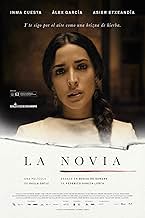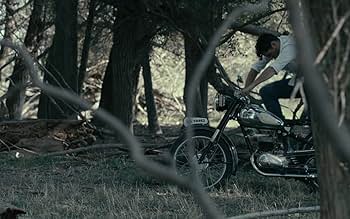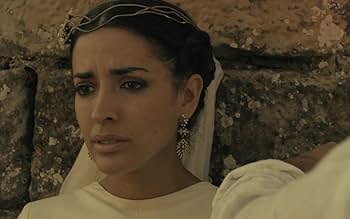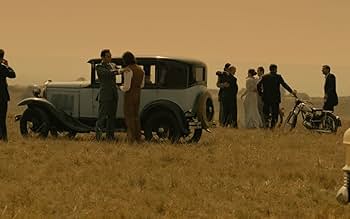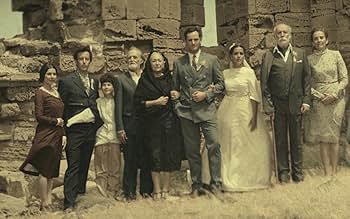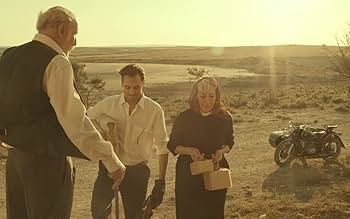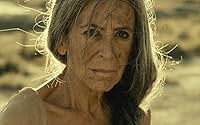NOTE IMDb
6,6/10
3,6 k
MA NOTE
Un conte tragique de désirs inassouvis et d'envies interdites, de choix conflictuels, de tromperie et de fatalité, vécu par trois amants impuissants devant la véritable nature de l'être huma... Tout lireUn conte tragique de désirs inassouvis et d'envies interdites, de choix conflictuels, de tromperie et de fatalité, vécu par trois amants impuissants devant la véritable nature de l'être humain.Un conte tragique de désirs inassouvis et d'envies interdites, de choix conflictuels, de tromperie et de fatalité, vécu par trois amants impuissants devant la véritable nature de l'être humain.
- Réalisation
- Scénario
- Casting principal
- Récompenses
- 19 victoires et 34 nominations au total
Carmela Labordeta
- Novia Joven
- (as Carmela del Campo)
Avis à la une
in many senses. not all easy to seduce. slow motion cinematography, landscapes from Capadoccia, poetic images, admirable presence of Maria Alfonsa Rosso and Garcia Lorca play atmosphere. a film who must admire ignoring the story because the first scenes are enough for know the evolution of the relations between characters to the tragic end. and the accuracy to the play is sacrificed for the noble desire to give an art film. result - "La novia" is one of films for a reduced target. a public who discovers more than the good intentions of the director or the changes by the play. a public seduced by atmosphere. by poetry of image. by the similarities with other tragic love stories. a film seduced by costumes and air and broken glass and costumes and old earrings. nostalgia. and justice.
Based on the old Spanish play about a wedding tragedy. It all sets in the rural Spain and tells the story of a bride who involved in a love triangle. It takes us back to her childhood day to reveal us her crush on one of two friends, but feudal between the friends families puts her in a tight spot. Especially as growing up knowing she has to choose one of them to marry. Finally the time comes to that, the day is set for the big occasion, but an unexpected twist brings a chaos during the celebration and the old rivalry awakens among the young generation.
It was a little dull narrative, mostly because of the quietness and lack of depth in both the character explorations and the story. I might say it is only a finishing touch work, we can't get any details we want for a better understanding, especially the past events remains slightly mysterious like how it all began. That's fine, because they thought they chopped away the boring stuffs, and yes they did, yet that did not bring any good result either.
Anyway, this film's focus was the three friends who grew up together, so this story is only about what happens around them. Beside them, the old woman who often appears is a puzzle that's need to be explained. But I assumed she's kind of witch who manipulating the peoples mind to go against each other.
Since it revolves on a wedding event, I was desperately looking forward the ceremony to begin. That's the other reason I felt letdown for it to delay. Until then the pace was too slow to keep myself engaged with this, but once the celebration began, it lit up my mood and followed by the conclusion that came with a light speed. So I kind liked the third act in the entire narration and according to me, that's the best part of the film.
"Bitterness is the worst punishment of all."
There's nothing much happens in the story section, we can easily know what's coming up next after the each scene. Because like I said, there's no great developments, everything was about getting ready for the marriage and during the marriage. It is like learning everything about it prior to the watch, yet the final scene, the solution was stronger than I expected. For an end like that I expected tearjerker atmosphere. The emotions showed between the characters, but for the viewers those are ineffective.
Shot in the cool places, I mean it looked like a semi-desert that did not bring the Spanish atmosphere of my knowledge, but blended well with the story. The character executions were fine, even the direction was good, but the writing was a disappointment. This 80 year old story needed a serious update, because the presentation was very stylish, but the tale was so simple. Yes, it looks so simple to follow, but complicated to fully understand it.
Just keep in mind that it is not a romance nor a revenge film, but a slice of equal both. About other things as well like love, life, family, culture, especially the three main characters linked with, such as the bride's choice, the groom's fate and the their friend's deception. This is definitely not an entertaining film, not for people like me, but what I call it is a story to decode. Like in the line of 'Enemy', 'Upstream Color', 'Borgman' et cetera. There're lot more about it than what actually the story tells, but only discussing with others who had watched it will bring the details out. Honestly, I was not very impressed with this, certainly not a bad film to ignore it completely.
6½/10
It was a little dull narrative, mostly because of the quietness and lack of depth in both the character explorations and the story. I might say it is only a finishing touch work, we can't get any details we want for a better understanding, especially the past events remains slightly mysterious like how it all began. That's fine, because they thought they chopped away the boring stuffs, and yes they did, yet that did not bring any good result either.
Anyway, this film's focus was the three friends who grew up together, so this story is only about what happens around them. Beside them, the old woman who often appears is a puzzle that's need to be explained. But I assumed she's kind of witch who manipulating the peoples mind to go against each other.
Since it revolves on a wedding event, I was desperately looking forward the ceremony to begin. That's the other reason I felt letdown for it to delay. Until then the pace was too slow to keep myself engaged with this, but once the celebration began, it lit up my mood and followed by the conclusion that came with a light speed. So I kind liked the third act in the entire narration and according to me, that's the best part of the film.
"Bitterness is the worst punishment of all."
There's nothing much happens in the story section, we can easily know what's coming up next after the each scene. Because like I said, there's no great developments, everything was about getting ready for the marriage and during the marriage. It is like learning everything about it prior to the watch, yet the final scene, the solution was stronger than I expected. For an end like that I expected tearjerker atmosphere. The emotions showed between the characters, but for the viewers those are ineffective.
Shot in the cool places, I mean it looked like a semi-desert that did not bring the Spanish atmosphere of my knowledge, but blended well with the story. The character executions were fine, even the direction was good, but the writing was a disappointment. This 80 year old story needed a serious update, because the presentation was very stylish, but the tale was so simple. Yes, it looks so simple to follow, but complicated to fully understand it.
Just keep in mind that it is not a romance nor a revenge film, but a slice of equal both. About other things as well like love, life, family, culture, especially the three main characters linked with, such as the bride's choice, the groom's fate and the their friend's deception. This is definitely not an entertaining film, not for people like me, but what I call it is a story to decode. Like in the line of 'Enemy', 'Upstream Color', 'Borgman' et cetera. There're lot more about it than what actually the story tells, but only discussing with others who had watched it will bring the details out. Honestly, I was not very impressed with this, certainly not a bad film to ignore it completely.
6½/10
This is a Passionate and Extreme Movie plenty of love , drama , tragedy and death . It deals with the story of a love triangle between two young men (Asier Etxeandia , Alex Garcia) and a woman (Imma Cuesta) , the Bride , who is a Triumph of Beauty. Inseparable since childhood, the Bride and the Groom share a gentle, and yet, ardent passion, stronger than the desolate, exposed and stark land that encircles them and perhaps even stronger than love itself. And the Bride follows through the air, like a blade of grass . Then the Neighbor (Ana Fernández) comes to chat with The Mother (Luisa Gavasa , Goya Academy Award winner ) , and reveals to her that The Bride was previously involved with a man named Leonardo Felix, a relative of the men who murdered The Mother's husband. The Mother, who still hates the Felix family, is furious, but decides to visit the girl before bringing the matter up with The Groom. But the lovers carried away by their passion defying all moral and social habits . Their disobedience will have unexpected consequences. Now riddled with indecision, the fair Bride is due to marry the gentle and stalwart Groom, however, the unconventional Leonardo, a married man (married to Leticia Dolera) with a baby and a mutual childhood friend, still feels the same unrestful, reckless, still, achingly hopeless passion for the Bride. Eventually, as the Bride silently prepares for her wedding , the feeble flesh will soon succumb to carnal yearning , devoured by deception and to the long-boiling passion .
A few of the themes present in ¨Blood Wedding¨ are the cycle of life, the progression of time, conflicted choices, anguish , deception, fate, forbidden yearnings, unappeased desires and nature. The unavoidable fate of three lovers standing powerless before the true nature of man , along with a Freudian reading of the play reveals Lorca to be exploring human nature. The theme of choice is evident in the characters of Leonardo, the bride, and the bridegroom.The theme of fate also ties into the themes of choice and deception. The bride's choice to marry the groom, despite the fact that she still loves Leonardo. This is ironic, because she attempts to choose both men and loses both of them instead. Fate plays an important role in the plot of Blood Wedding, with its plot twists and final outcome. Finally, the theme of nature is present in Blood Wedding: the moon, the trees, the river, death (in the form of the beggar woman), the vineyard, orange blossoms, etc. These references to nature suggest that there is something predetermined in human nature, and relates back to fate. Main cast are pretty good , a decent trio protagonist : Inma Cuesta , Asier Etxeandia , Álex García . Frankly marvelous support cast such as : Luisa Gavasa , Carlos Álvarez-Nóvoa , Leticia Dolera Ana Fernández , Trujillo , María Alfonsa Rosso , Manuela Vellés , Mariana Cordero . It contains a luxurious and brilliant cinematography by Migue Amoedo , set in the middle of the pale desert and barren land . Being shot on location in Cappadoccia, Turkey , Monasterio de Casbas, Huesca, Aragón , El Temple, Huesca, Aragón , Los Monegros, Zaragoza , Aragón, Spain . Sensitive and rousing musical score by synthesizer , being composed by Shigeru Umebayashi . The motion picture was professionally directed by Paula Ortiz .
The play has been adapted as stage as cinemas as TV and translated into English and retitled Bitter Oleander, had a brief Broadway run in 1935. The play was adapted as a Spanish film in 1938, with Margarita Xirgu in the starring role she'd previously played on stage.The play was adapted as an Italian film in 1941, also titled Blood Wedding.The 1957 opera Bluthochzeit by Wolfgang Fortner is adapted from Henrique Beck's German translation of the play.In 1959, BBC Television made an adaptation of the play. In 1964, Vérnász, an operatic adaptation of the play with a score by Hungarian composer Sándor Szokolay, was first produced in Budapest. The opera has been produced again in the years since. In 1973, the play was produced in English translation at La MaMa Experimental Theatre Club in Manhattan, New York.The play was adapted as a Moroccan film in 1977, also titled Blood Wedding. In 1981, Spanish film director Carlos Saura directed a dance film based on the play, also titled Blood Wedding.In 1986, the BBC World Service broadcast a radio adaptation of the play starring Anna Massey, Juliet Stevenson, and Alan Rickman.A 2006 Haitian operatic adaptation of the play, titled Le Maryaj Lenglensou, was produced by Dutch filmmaker Hans Fels with a score by Haitian composer Iphares Blain. A documentary about this production premiered at the 2007 Netherlands Film Festival.In 2007, BBC Radio 3 broadcast a new production of the play, using the Ted Hughes translation and featuring Barbara Flynn as The Mother. Finally , in 2015, this Spanish film adaptation titled The Bride directed by Paula Ortiz was released.
A few of the themes present in ¨Blood Wedding¨ are the cycle of life, the progression of time, conflicted choices, anguish , deception, fate, forbidden yearnings, unappeased desires and nature. The unavoidable fate of three lovers standing powerless before the true nature of man , along with a Freudian reading of the play reveals Lorca to be exploring human nature. The theme of choice is evident in the characters of Leonardo, the bride, and the bridegroom.The theme of fate also ties into the themes of choice and deception. The bride's choice to marry the groom, despite the fact that she still loves Leonardo. This is ironic, because she attempts to choose both men and loses both of them instead. Fate plays an important role in the plot of Blood Wedding, with its plot twists and final outcome. Finally, the theme of nature is present in Blood Wedding: the moon, the trees, the river, death (in the form of the beggar woman), the vineyard, orange blossoms, etc. These references to nature suggest that there is something predetermined in human nature, and relates back to fate. Main cast are pretty good , a decent trio protagonist : Inma Cuesta , Asier Etxeandia , Álex García . Frankly marvelous support cast such as : Luisa Gavasa , Carlos Álvarez-Nóvoa , Leticia Dolera Ana Fernández , Trujillo , María Alfonsa Rosso , Manuela Vellés , Mariana Cordero . It contains a luxurious and brilliant cinematography by Migue Amoedo , set in the middle of the pale desert and barren land . Being shot on location in Cappadoccia, Turkey , Monasterio de Casbas, Huesca, Aragón , El Temple, Huesca, Aragón , Los Monegros, Zaragoza , Aragón, Spain . Sensitive and rousing musical score by synthesizer , being composed by Shigeru Umebayashi . The motion picture was professionally directed by Paula Ortiz .
The play has been adapted as stage as cinemas as TV and translated into English and retitled Bitter Oleander, had a brief Broadway run in 1935. The play was adapted as a Spanish film in 1938, with Margarita Xirgu in the starring role she'd previously played on stage.The play was adapted as an Italian film in 1941, also titled Blood Wedding.The 1957 opera Bluthochzeit by Wolfgang Fortner is adapted from Henrique Beck's German translation of the play.In 1959, BBC Television made an adaptation of the play. In 1964, Vérnász, an operatic adaptation of the play with a score by Hungarian composer Sándor Szokolay, was first produced in Budapest. The opera has been produced again in the years since. In 1973, the play was produced in English translation at La MaMa Experimental Theatre Club in Manhattan, New York.The play was adapted as a Moroccan film in 1977, also titled Blood Wedding. In 1981, Spanish film director Carlos Saura directed a dance film based on the play, also titled Blood Wedding.In 1986, the BBC World Service broadcast a radio adaptation of the play starring Anna Massey, Juliet Stevenson, and Alan Rickman.A 2006 Haitian operatic adaptation of the play, titled Le Maryaj Lenglensou, was produced by Dutch filmmaker Hans Fels with a score by Haitian composer Iphares Blain. A documentary about this production premiered at the 2007 Netherlands Film Festival.In 2007, BBC Radio 3 broadcast a new production of the play, using the Ted Hughes translation and featuring Barbara Flynn as The Mother. Finally , in 2015, this Spanish film adaptation titled The Bride directed by Paula Ortiz was released.
Visually stunning and emotionally charged Spanish drama that delves into the complexities of love and passion.
First and foremost, Inma Cuesta's performance as the eponymous "Novia" (Bride) is captivating. She portrays the character's emotional turmoil and inner conflict with remarkable depth and vulnerability.
The film's cinematography is a standout feature, capturing the rugged and breathtaking landscapes of rural Spain. The visual storytelling adds an extra layer of beauty to the narrative.
La Novia explores themes of forbidden love, loyalty, and the consequences of past decisions. It weaves a tale of passion and tragedy, leaving a lasting impact on the viewer.
The emotional intensity of the film is heightened by a haunting musical score that perfectly complements the story's dramatic beats.
The supporting cast, including Álex García and Asier Etxeandia, deliver solid performances, adding depth to the complex web of relationships.
However, some viewers may find the film's pacing slow, as it takes its time to delve into the intricacies of the characters' emotions and relationships.
In conclusion, La Novia is a visually striking and emotionally charged drama that immerses viewers in a world of passion and heartache. With Inma Cuesta's compelling performance, the stunning cinematography, and the film's exploration of forbidden love, it's a cinematic experience that leaves a lasting impression.
If you appreciate atmospheric and emotionally-driven films with a touch of romance, La Novia is a must-watch. It's a poignant and visually captivating journey into the complexities of human relationships and the power of love.
First and foremost, Inma Cuesta's performance as the eponymous "Novia" (Bride) is captivating. She portrays the character's emotional turmoil and inner conflict with remarkable depth and vulnerability.
The film's cinematography is a standout feature, capturing the rugged and breathtaking landscapes of rural Spain. The visual storytelling adds an extra layer of beauty to the narrative.
La Novia explores themes of forbidden love, loyalty, and the consequences of past decisions. It weaves a tale of passion and tragedy, leaving a lasting impact on the viewer.
The emotional intensity of the film is heightened by a haunting musical score that perfectly complements the story's dramatic beats.
The supporting cast, including Álex García and Asier Etxeandia, deliver solid performances, adding depth to the complex web of relationships.
However, some viewers may find the film's pacing slow, as it takes its time to delve into the intricacies of the characters' emotions and relationships.
In conclusion, La Novia is a visually striking and emotionally charged drama that immerses viewers in a world of passion and heartache. With Inma Cuesta's compelling performance, the stunning cinematography, and the film's exploration of forbidden love, it's a cinematic experience that leaves a lasting impression.
If you appreciate atmospheric and emotionally-driven films with a touch of romance, La Novia is a must-watch. It's a poignant and visually captivating journey into the complexities of human relationships and the power of love.
Beautiful and fantastic (as in fantasy!) photography and scenery: the greatest contribution made by cinematography in the direction of Paula Ortiz to the already thriving "Bodas de Sangre" play by Federico Garcia Lorca.
A play full of strong and deep poetry in which the destiny of the characters are controlled and dictated by their deepest emotions as if these emotions were fierce Gods that are far beyond any human control or law, and just as the ancient Gods of most mythologies played with the destiny of the mortals as if leafs in the winds, the emotions portrayed in this film do the same to the lives of every single character in this film: merciless, relentlessly.
Talking specifically about the film, one of the new 'extensions' added in the film and absent in the play, is the great metaphor of the crystals all across the film. Lorca use the word 'cristal' and 'vidrio' plenty of times in the play without referring to an actual crystal but as literary resource, and the development of this idea in images is magical and beautiful.
A downside of the film, for those who cannot understand Spanish, is the very lame translation in the English captions. I do speak Spanish as my native tongue but I had to turn the captions on at some moments because they whisper a lot and some pronunciations are difficult to grasp. As I said, this film is full of delightful poetry, not only visually but literally and is a shame that the translator didn't seem to notice that, as a result some of the most brilliant moments of the movie become plain and bland if reading the English translation. There is even one moment in which the translation express exactly the opposite to the original meaning.
Not taking in great consideration this last thing, La Novia is an amazing film that I would recommend to everyone except to those that faint when they see blood.
A play full of strong and deep poetry in which the destiny of the characters are controlled and dictated by their deepest emotions as if these emotions were fierce Gods that are far beyond any human control or law, and just as the ancient Gods of most mythologies played with the destiny of the mortals as if leafs in the winds, the emotions portrayed in this film do the same to the lives of every single character in this film: merciless, relentlessly.
Talking specifically about the film, one of the new 'extensions' added in the film and absent in the play, is the great metaphor of the crystals all across the film. Lorca use the word 'cristal' and 'vidrio' plenty of times in the play without referring to an actual crystal but as literary resource, and the development of this idea in images is magical and beautiful.
A downside of the film, for those who cannot understand Spanish, is the very lame translation in the English captions. I do speak Spanish as my native tongue but I had to turn the captions on at some moments because they whisper a lot and some pronunciations are difficult to grasp. As I said, this film is full of delightful poetry, not only visually but literally and is a shame that the translator didn't seem to notice that, as a result some of the most brilliant moments of the movie become plain and bland if reading the English translation. There is even one moment in which the translation express exactly the opposite to the original meaning.
Not taking in great consideration this last thing, La Novia is an amazing film that I would recommend to everyone except to those that faint when they see blood.
Le saviez-vous
- AnecdotesDirector Paula Ortiz cares immensely about the artistry of the shots and takes, that's why the cast usually had to act through adverse or unpleasant environment conditions. For example, the scene when the bride sings "la Tarara" was filmed in the middle of the desert of Los Monegros at 5 a.m. Actors also had to deal with strong wind (cierzo), blinding light or mosquitoes, or even against the clock filming when the scenes happened at sunset.
- GaffesThe groom chases the unfaithful bride on a BMW R25/2, formerly seen in the film with a sidecar. When he arrives, he rides an unidentified motorcycle (could it be a BSA?) which stalls.
Meilleurs choix
Connectez-vous pour évaluer et suivre la liste de favoris afin de recevoir des recommandations personnalisées
- How long is The Bride?Alimenté par Alexa
Détails
- Date de sortie
- Pays d’origine
- Site officiel
- Langue
- Aussi connu sous le nom de
- The Bride
- Lieux de tournage
- Sociétés de production
- Voir plus de crédits d'entreprise sur IMDbPro
Box-office
- Budget
- 1 187 147 € (estimé)
- Montant brut mondial
- 1 779 966 $US
- Durée
- 1h 36min(96 min)
- Couleur
Contribuer à cette page
Suggérer une modification ou ajouter du contenu manquant

![Regarder Tráiler [OV]](https://m.media-amazon.com/images/M/MV5BMzg3YWM0YjAtNDg2ZC00ZGE0LWJhYzMtNzg3NjBmYTcxY2FhXkEyXkFqcGdeQXRyYW5zY29kZS13b3JrZmxvdw@@._V1_QL75_UX500_CR0)
![Teaser Tráiler [OV]](https://m.media-amazon.com/images/M/MV5BNTVjMzNlNGEtMDNhNi00MGY1LTgxNzUtZDc3YjA2NGUyODE0XkEyXkFqcGdeQXRyYW5zY29kZS13b3JrZmxvdw@@._V1_QL75_UX500_CR0)
